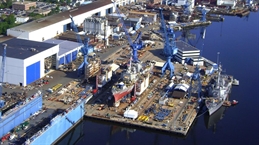
The International Chamber of Shipping (ICS) has heightened the shipping industry's concerns regarding the U.S. planned port fees for vessels built in China and fleets that include Chinese-built vessels or have vessels on order from China, warning that, once implemented, the proposal could disrupt supply chains entirely.
The ICS, one of the world's principal global trade associations for merchant shipowners and operators, representing all sectors and trades and over 80% of the world's merchant fleet, said it supports the goal of strengthening U.S. shipbuilding.
It noted that a "robust, competitive shipbuilding sector benefits global trade" and that the international shipping industry wants more choices, not less.
Nonetheless, it cautioned against the U.S. Trade Representative’s (USTR) proposed port fees of up to US$1.5 million per port of call and how they would impact the shipping industry, American consumers, and global supply chains.
The ICS Secretary General, Guy Platten, testified before the USTR Section 301 Committee in Washington, D.C., U.S., regarding concerns about potential unintended consequences that could result from the proposed remedies following the Committee’s investigation into China’s maritime logistics and shipbuilding.
"As raised during the hearing by multiple representatives, the proposed fees on Chinese-operated and Chinese-built vessels risk significant unintended consequences," the ICS said in a comment after the hearing.
It added that these measures could disrupt supply chains, raise costs for U.S. consumers and exporters, and reduce the global competitiveness of vital U.S. sectors—particularly agriculture, energy, and manufacturing.
Unique business model of the shipping industry
"When looking at our sector, the shipping industry is one of the most cost-optimized in the world. The business model is designed to drive down costs, while not compromising on safety standards, so that goods can efficiently flow from and to countries, for the benefit of those countries' economies and populations…the shipping industry is not like a traditional business, it is unique," Platten said at the USTR hearing.
ICS commented that these proposed measures, as currently constituted, won't deter Chinese shipbuilding. However, they could "severely disrupt U.S. maritime supply chains, threaten the US' energy, food and economic security, and ultimately cut U.S. businesses off from the very ships they rely on."
"These proposed measures could hurt our customers - the American people. They will make vital U.S. exports less competitive globally. This hurts jobs, be that at ports or at farms, and the American shipping industry, the very thing you are trying to encourage," Platten added in his testimony.
At the hearing, ICS urged the USTR to explore alternative policies that strengthen American shipbuilding without disrupting trade or harming the very industries these actions aim to support.
ICS offered to work alongside the USTR and the White House to develop practical, future-focused solutions that deliver lasting value for U.S. industry, consumers, and maritime resilience.
The public hearing took place over two days, Monday, March 24, and Wednesday, March 26, 2025, with over 60 witnesses testifying in person.
The planned port fees stem from the findings of a January USTR investigation that revealed that China's share of global shipbuilding tonnage surged from 5% in 1999 to over 50% by 2023, largely due to extensive state subsidies and preferential treatment for state-owned enterprises, which has pushed out private-sector and international competitors.
In contrast, the report noted a significant decline in shipbuilding activities within the U.S. since the 1970s. The USTR said that while American shipyards produced 70 vessels in 1975, they now only construct about five ships annually.



